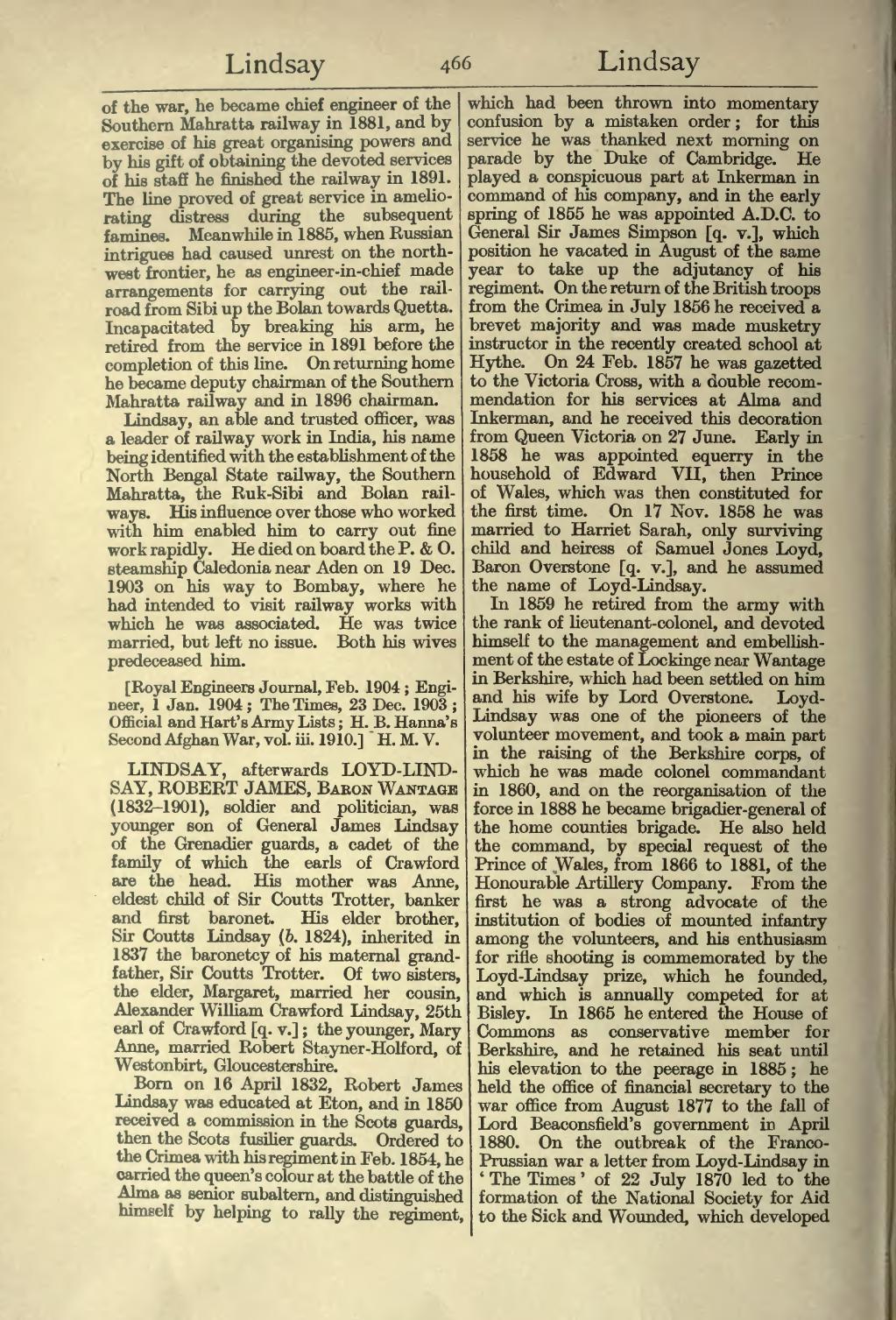of the war, he became chief engineer of the Southern Mahratta railway in 1881, and by exercise of his great organising powers and by his gift of obtaining the devoted services of his staff he finished the railway in 1891. The line proved of great service in ameliorating distress during the subsequent famines. Meanwhile in 1885, when Russian intrigues had caused unrest on the north-west frontier, he as engineer-in-chief made arrangements for carrying out the railroad from Sibi up the Bolan towards Quetta. Incapacitated by breaking his arm, he retired from the service in 1891 before the completion of this line. On returning home he became deputy chairman of the Southern Mahratta railway and in 1896 chairman.
Lindsay, an able and trusted officer, was a leader of railway work in India, his name being identified with the establishment of the North Bengal State railway, the Southern Mahratta, the Ruk-Sibi and Bolan railways. His influence over those who worked with him enabled him to carry out fine work rapidly. He died on board the P. & O. steamship Caledonia near Aden on 19 Dec. 1903 on his way to Bombay, where he had intended to visit railway works with which he was associated. He was twice married, but left no issue. Both his wives predeceased him.
[Royal Engineers Journal, Feb. 1904; Engineer, 1 Jan. 1904; The Times, 23 Dec. 1903; Official and Hart's Army Lists; H. B. Hanna's Second Afghan War, vol. iii. 1910.]
LINDSAY, afterwards LOYD-LINDSAY, ROBERT JAMES, Baron Wantage (1832–1901), soldier and politician, was younger son of General James Lindsay of the Grenadier guards, a cadet of the family of which the earls of Crawford are the head. His mother was Anne, eldest child of Sir Coutts Trotter, banker and first baronet. His elder brother. Sir Coutts Lindsay {b. 1824), inherited in 1837 the baronetcy of his maternal grand-father, Sir Coutts Trotter. Of two sisters, the elder, Margaret, married her cousin, Alexander William Crawford Lindsay, 25th earl of Crawford [q. v.]; the younger, Mary Anne, married Robert Stayner-Holford, of Westonbirt, Gloucestershire.
Born on 16 April 1832, Robert James Lindsay was educated at Eton, and in 1850 received a commission in the Scots guards, then the Scots fusilier guards. Ordered to the Crimea with his regiment in Feb. 1854, he carried the queen's colour at the battle of the Alma as senior subaltern, and distinguished himself by helping to rally the regiment, which had been thrown into momentary confusion by a mistaken order; for this service he was thanked next morning on parade by the Duke of Cambridge. He played a conspicuous part at Inkerman in command of his company, and in the early spring of 1855 he was appointed A.D.C. to General Sir James Simpson [q. v.], which position he vacated in August of the same year to take up the adjutancy of his regiment. On the return of the British troops from the Crimea in July 1856 he received a brevet majority and was made musketry instructor in the recently created school at Hythe. On 24 Feb. 1857 he was gazetted to the Victoria Cross, with a double recommendation for his services at Alma and Inkerman, and he received this decoration from Queen Victoria on 27 June. Early in 1858 he was appointed equerry in the household of Edward VII, then Prince of Wales, which was then constituted for the first time. On 17 Nov. 1858 he was married to Harriet Sarah, only surviving child and heiress of Samuel Jones Loyd, Baron Overstone [q. v.], and he assumed the name of Loyd-Lindsay.
In 1859 he retired from the army with the rank of lieutenant-colonel, and devoted himself to the management and embellishment of the estate of Lockinge near Wantage in Berkshire, which had been settled on him and his wife by Lord Overstone. Loyd-Lindsay was one of the pioneers of the volunteer movement, and took a main part in the raising of the Berkshire corps, of which he was made colonel commandant in 1860, and on the reorganisation of the force in 1888 he became brigadier-general of the home counties brigade. He also held the command, by special request of the Prince of Wales, from 1866 to 1881, of the Honourable Artillery Company. From the first he was a strong advocate of the institution of bodies of mounted infantry among the volunteers, and his enthusiasm for rifle shooting is commemorated by the Loyd-Lindsay prize, which he founded, and which is annually competed for at Bisley. In 1865 he entered the House of Commons as conservative member for Berkshire, and he retained his seat until his elevation to the peerage in 1885; he held the office of financial secretary to the war office from August 1877 to the fall of Lord Beaconsfield's government in April 1880. On the outbreak of the Franco-Prussian war a letter from Loyd-Lindsay in 'The Times' of 22 July 1870 led to the formation of the National Society for Aid to the Sick and Wounded, which developed
